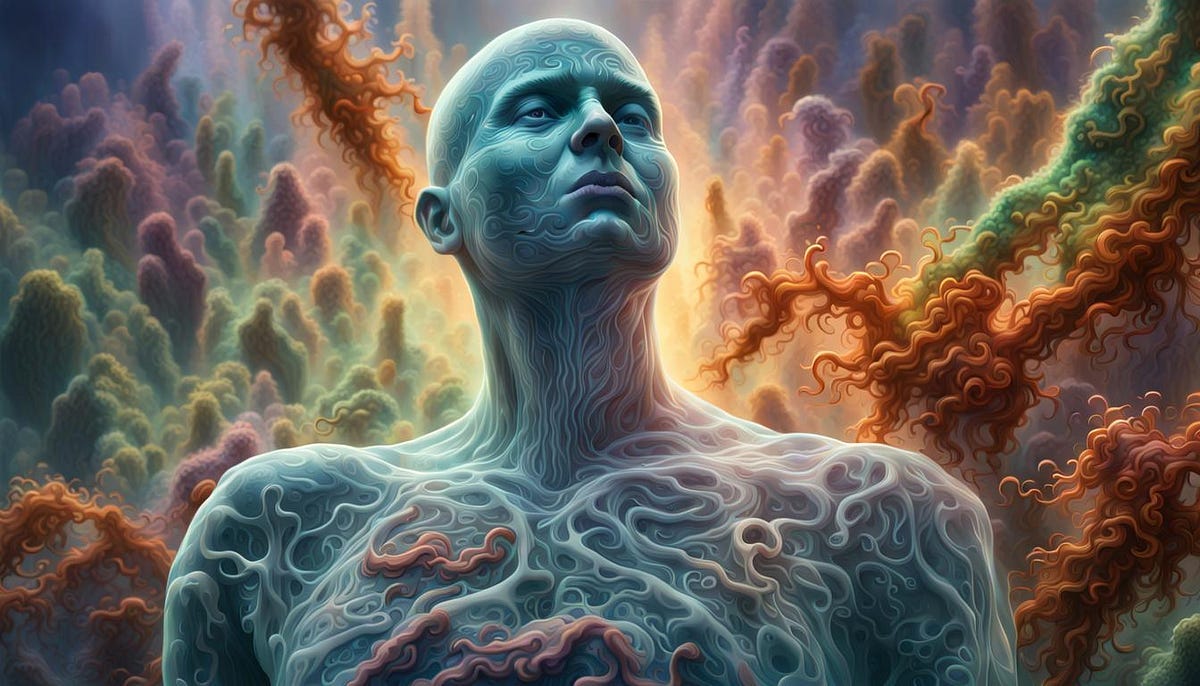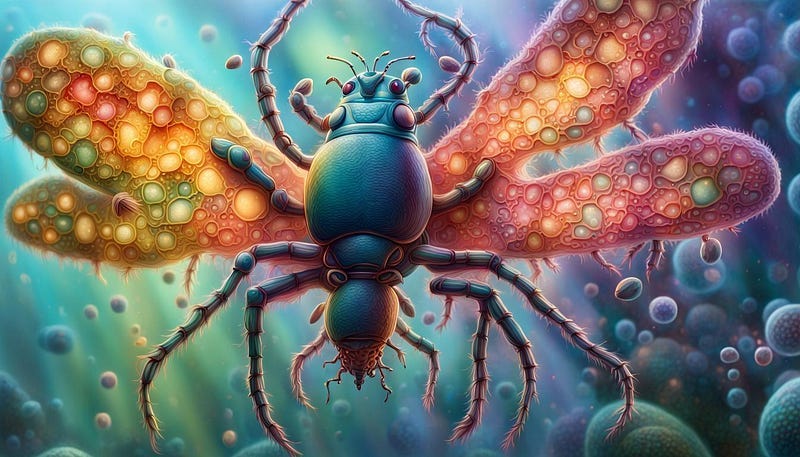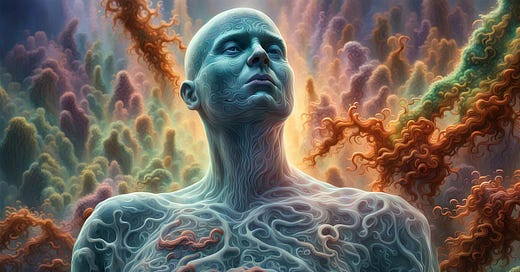Your Body’s True Purpose Revealed — Mere Transport for the Microbes
Your are a mere vessel for the microbes who dictate the terms of your health and vitality!
You are a mere vessel for the microbes who dictate the terms of your health and vitality!

That’s right, you heard! Our main purpose is to house and feed the trillions of little microbes that cover almost every inch of our corpulent carcasses, both inside and out.
Bugs, tics, bacteria, viruses, and even fungi are permanent parts of you, not just temporary visitors along for the ride — they are actually part of YOU.
They are not only in our gut and mouth, but all over our skin, eyelashes, nose and ears, blood and bone, hair and crotch — everywhere!
And we can’t live without them, or at least most of them. They control everything from digestion, sleep, waste disposal and even our mood.
They go about their busy little lives, eating and defecating, mating and breeding, respiring and dying and generally making themselves at home in every little crack, nook and cranny in your body.
You are simply a large warm and wet mobile soup kitchen with armour.
The human body, with its intricate design and complex systems, has long been viewed as the pinnacle of evolution. However, a compelling theory challenges this anthropocentric perspective, suggesting that we are more than just individuals, we are, in fact, vessels for an astonishing array of microbes. This theory posits that the human body is essentially a transport vehicle, a habitat for trillions of microorganisms that play pivotal roles in our health, development, and even behaviour.
So, let me examine the latest theories, deliver some compelling examples, and weigh up the facts that support this paradigm-shifting idea.
Microbial abundance
To understand the notion of the human body as a microbial transport vessel, you must first grasp the sheer abundance of microorganisms that call us home. The human microbiome, the collective genome of microbes inhabiting our bodies, is a vast and diverse ecosystem. Trillions of bacteria, viruses, fungi, and other microorganisms collectively constitute a thriving community that outnumbers our own human cells.
Dynamic interactions
Recent studies have revealed the dynamic interactions within this microbial multitude. The microbiome is not a passive bystander, it actively participates in fundamental physiological processes. From aiding digestion and nutrient absorption to modulating the immune system and influencing mental health, these microscopic inhabitants are integral to our well-being.
Holobiont Concept
The concept of the “holobiont” encapsulates the idea that an individual organism is not a discrete entity but a composite of the host organism and its associated microbial communities. This holistic viewpoint challenges the traditional notion of the human body as a self-contained unit and instead portrays us as ecosystems in constant symbiotic exchange with our microbial counterparts.
Mutualistic relationships
The relationships between humans and their microbial passengers are often mutually beneficial. For example, gut bacteria play a crucial role in breaking down complex carbohydrates that our own digestive enzymes cannot process. In return, these microbes find a nourishing habitat within our intestines. This reciprocal arrangement is a testament to the intricate dance of evolution that has shaped our symbiotic existence.
From birth to adulthood
The journey of the human body as a microbial transport vessel begins at birth. Emerging research suggests that the mode of delivery — whether through vaginal birth or Cesarean section — impacts the initial microbial colonisation of an infant. This seeding of microbes during the birthing process sets the stage for the development of the microbiome.
Critical windows of development
Microbial influences extend beyond infancy, shaping various aspects of our development. The gut microbiome, for instance, has been linked to the maturation of the immune system and even neurological development. Understanding these critical windows of development provides insights into how microbes contribute to the orchestration of our biological symphony.
Microbial mind control
The intriguing connection between microbes and behavior has sparked a new frontier in scientific inquiry. Studies have suggested that the gut-brain axis, a bidirectional communication system between the gut and the central nervous system, plays a role in influencing mood and behaviour. Could the microbes within us be pulling the strings of our emotions?
Microbial modulation of brain chemistry
Recent experiments with germ-free mice, raised in a sterile environment devoid of microbes, have provided tantalizing clues. These mice display altered patterns of behaviour and brain chemistry, hinting at the profound impact that microbes may have on our cognitive and emotional states. The implications of these findings raise questions about the extent of microbial influence on human behaviour.
Microbiome manipulation
As we unravel the intricate connections between the human body and its microbial inhabitants, the prospect of manipulating the microbiome for therapeutic purposes emerges. Fecal microbiota transplantation, for example, has shown promise in treating certain gastrointestinal disorders by introducing a healthy microbial community into a disrupted ecosystem.
Microbial medicine
The field of microbial medicine is at the forefront of exploring the therapeutic potential of our microbial passengers. Probiotics, prebiotics, and even personalized microbiome interventions hold the promise of addressing a myriad of health issues. The microbial transport vessel, once viewed as a mere host, becomes a potential target for interventions aimed at restoring balance and promoting well-being.
We are still at the frontiers of microbial science, and the idea of the human body as a transport vessel for microbes challenges our traditional understanding of selfhood. From the complex interplay of microbial communities within our bodies to their influence on development, behaviour, and health, the evidence points to a symbiotic relationship that challenges individuality.
The microbial army within us raises profound questions about our role in this biological partnership. Are we drivers or passengers in the microbial transport vessel, and to what extent do these microscopic inhabitants shape our destinies?

As research continues to unfold, the answers to these questions promise to reshape our understanding of what it truly means to be human — a complex, interconnected ecosystem navigating the cosmos with trillions of microbial co-pilots.
Just how many microbes are in your body?
Estimating the exact percentage of the weight of the average human body accounted for by the mass of all its microorganisms is a challenging task. The human microbiome, consisting of bacteria, viruses, fungi, and other microorganisms, is incredibly diverse and varies between individuals.
However, a frequently cited figure is that the microbial cells in the human body may outnumber human cells by a ratio of around 1.3 to 1. This suggests that the microbial mass might be comparable to or even exceed the mass of human cells. Despite this, microorganisms are much smaller than human cells on average.
In terms of weight, it’s often mentioned that the microbiome could contribute approximately 1 to 3 pounds (0.5 to 1.5 kilograms) to the total weight of an average adult human, which typically ranges from 125 to 200 pounds (56 to 90 kilograms).
It’s important to note that these figures are rough estimates, and research in the field of microbiome science is ongoing. The composition and abundance of microbial communities can vary significantly between individuals, and our understanding of the human microbiome is still evolving.
So here’s the thought.
Are you the main protagonist here, simply carrying a baggage of little interlopers?
Or, is this a mixed colony of thriving beasties with a nice comfy, obedient mobile home?
Perhaps it’s just a conglomerate of living beings in a symbiotic agreement, where we are not the boss, just a constituent part of the whole happy group.




